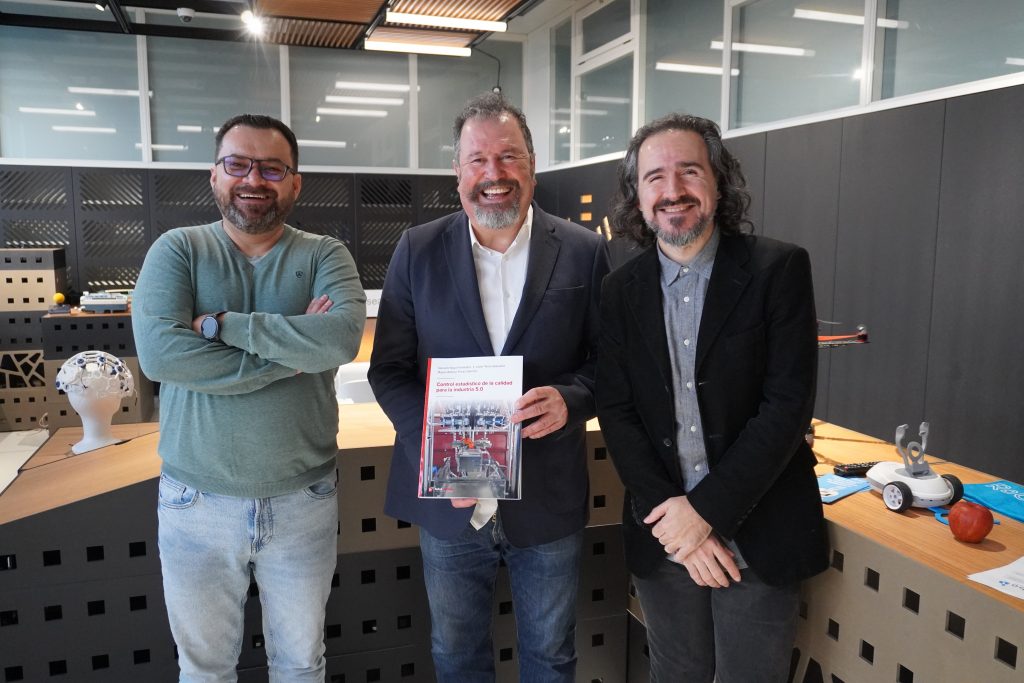
Industry 5.0: When Technology and Sustainability Work Together
- Salvador Naya, Javier Tarrío, and Miguel Alfonso Flores Publish the Book “Statistical Quality Control for Industry 5.0”.
- Researchers delve into statistical techniques for process control and quality improvement, including methods for analyzing and reducing variability in processes defined by complex data, the application of statistical learning and machine learning, and strategies to enhance reliability in intelligent systems.
A Coruña, March 3, 2025.- “Statistical Quality Control for Industry 5.0” is the recently published book by researchers from CITIC at UDC: Salvador Naya, Javier Tarrío, and Miguel Alfonso Flores, a professor at the National Polytechnic School of Quito, Ecuador. The book provides a comprehensive and up-to-date overview of statistical quality control in the context of the latest industrial revolution.
One of the book’s most innovative aspects is its focus on problem-solving through computational statistics. The authors provide practical tools for implementing these techniques using R statistical software, facilitating their application in real-world environments. They also address emerging trends such as real-time quality control, complex data management, and ethical challenges associated with artificial intelligence in industrial processes.
This work traces the historical evolution of quality control, from its origins to its most advanced applications in Industry 5.0. Key aspects such as human-machine collaboration, advanced customization, and sustainability are highlighted as essential elements for improving modern industrial processes.
Throughout its chapters, the book explores novel statistical techniques, including methods for analyzing and reducing variability in processes defined by complex data, quality control for functional and multivariate data, the application of statistical learning and machine learning in quality control, and strategies to enhance the reliability of intelligent systems.
«We offer a complete and updated vision of how to ensure quality in the era of digitalization and sustainability. This book integrates the latest innovations, such as human-machine collaboration, advanced customization, and the use of artificial intelligence. Our goal is to provide professionals, engineers, and students with the keys to facing the challenges of the industry of the future”, explain the authors.
About the Authors
Salvador Naya Fernández is a professor of Statistics and Operations Research at UDC and a researcher at CITIC, with over three decades of experience in teaching, research, and university management. His work focuses on statistical modeling and quality control, leading numerous research and technology transfer projects with industry.
Javier Tarrío Saavedra is an Industrial Engineer and holds a Ph.D. in Statistics and Operations Research. His research at CITIC focuses on statistical quality control and industrial statistics. He has authored scientific works in various fields, including statistics, engineering, materials science, energy efficiency, and epidemiology, among others. He has been recognized with awards for his contributions to innovation and knowledge transfer in statistics.
Miguel Alfonso Flores Sánchez is a professor at the National Polytechnic School of Quito (Ecuador) and holds a Ph.D. in Statistics and Operations Research. His career spans over 20 years in research and consulting in computational statistics, machine learning, and quality control. He has led various national and international projects and has made significant contributions to the application of advanced statistical models.
About CITIC
CITIC is a research center that fosters progress and excellence in applied R&D&I in ICT, established in 2008 by the University of A Coruña. The center’s scientific activity is structured into four main research areas: Artificial Intelligence; Data Science and Engineering; High-Performance Computing; and Smart Services and Networks. Additionally, there is a transversal research area covering all of these: Cybersecurity.
CITIC is accredited as a Center of Excellence and a member of the CIGUS Network for the 2024-2027 period. The accreditation, structuring, and improvement of CITIC are co-financed by the Xunta de Galicia and 60% by the European Union within the framework of the FEDER Galicia 2021-2027 Operational Program, with the thematic objective of promoting “a smarter Europe: innovative economic transformation”.





